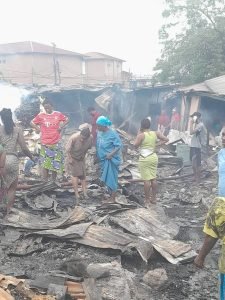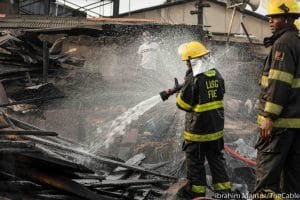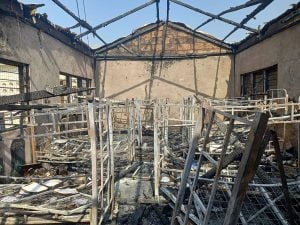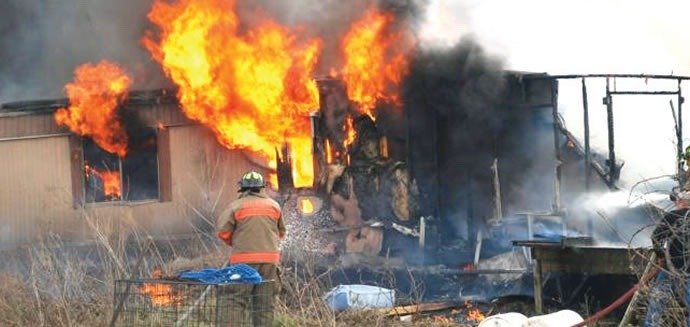Fire outbreaks have become a terrifyingly frequent crisis in Nigeria’s booming cities of Lagos, Abuja, and Port Harcourt. Yet, the nation’s firefighters, who should be its first line of defence, are woefully underfunded and equipped with outdated tools. As urbanisation accelerates and industrial expansion intensifies, this overlooked issue has become a life-threatening gap in the country’s emergency response. In this report, Sultan Rabiu explores how the country’s fire service struggles to keep pace with rising dangers.
Struggling Nigerian Firefighters Battle Rising Blazes with Inadequate Equipment
Recently, the world watched as the United States, one of the most developed countries globally, struggled to contain a massive fire outbreak in Los Angeles. It took their highly trained firefighters, equipped with state-of-the-art tools, days to bring the inferno under control. If a country with such advanced infrastructure faced such challenges, what then is the fate of Nigeria, where firefighting remains largely neglected?

A System in Crisis
The Nigerian fire service is in dire straits. Reports from firefighters on the ground paint a grim picture of outdated and insufficient equipment, poor funding, and lack of proper training. It is common for fire trucks to arrive at emergency scenes without water. Fire stations in many states either lack basic firefighting gear or have only one or two operational trucks—many of which are decades old.
According to a report by the news guru, the fire service ran out of water while tackling a fire outbreak at the mainland Oil/Gas station located along Kubwa Expressway in Abuja. According to the report the firefighters ran out of water and had to leave while the fire was still raging
In Effurun, Uvwie Local Government, Delta state, a report from Vanguard confirms that a building was engulfed by fire near a shopping plaza. While tackling the fire, the firefighters ran out of water.
In a recent report from News Express, A mother and her two children were burnt to death after they got trapped in a fire incident and efforts from their neighbours to help proved futile, the neighbours claimed that they called the fire service but the fire service ended the call saying “That there’s no water and chemicals”.
According to a statement by the Zonal Controller, zone F, southwest, Assistant Controller General of Fire Chike Njoku at a safety sensation drive, he raised concern about the absence of hydrants which were previously positioned to aid the service.

He said in the past the hydrants stationed across the town came in handy whenever there’s a fire incident.
“We used to have hydrants but today those hydrants are not there again. Before the reconstruction of these roads, we had hydrants; there was even one here at Yaba.
“In the past when you were moving along the streets you would see hydrants but now they are no longer there. As they are reconstructing the roads, those hydrants are blocked; making it difficult for us to get water during a fire outbreak.”
In Abuja, the Federal Fire Service headquarters boasts of relatively better equipment, but once you step outside the capital, the situation deteriorates. In states like Kano, Enugu, and Rivers, fire service personnel often lack basic protective gear such as fire-resistant clothing, breathing apparatus, and thermal imaging cameras—tools considered standard in developed nations.
The Cost of Neglect
According to the Federal Fire Service, Nigeria recorded the loss of 100 lives and properties worth ₦67. 1 billion to fire outbreaks in 2024 alone.
The consequences of this systemic failure are devastating. In 2023 alone, Nigeria recorded hundreds of fire incidents, many of which led to loss of lives, destruction of businesses, and displacement of families. Markets, which are economic lifelines for many Nigerians, frequently go up in flames, with little or no intervention. The recent fire at the popular Onitsha Main Market saw traders helplessly watching their goods worth millions of naira turn to ashes due to the inability of the fire service to respond promptly.

The oil sector, which is the backbone of Nigeria’s economy, has also suffered significant losses due to inadequate firefighting infrastructure. Pipeline explosions and fuel depot fires continue to occur, with response times often being too slow to prevent casualties.
Call to Action
There is an urgent need for an overhaul of Nigeria’s fire service. First, increased government funding is non-negotiable. Firefighting should not be treated as an afterthought but as a critical component of public safety. The government must invest in modern firefighting equipment, recruit and train more personnel, and establish fire stations in every local government area.
Additionally, enforcement of fire safety regulations must be prioritized. Many public buildings, including schools, markets, and government offices, lack functional fire extinguishers and emergency exits. Routine inspections should be conducted, and defaulters penalized.
Hydrants should be made available across the towns to aid the fire services in fighting fires, the Government should always keep it in mind when constructing buildings or reconstructing the roads to include hydrants in the plan work to enable easy water access for firefighters.
According to Chike Njoku, the Federal service is being hindered by the lack of access to water. “We are complaining to the appropriate quarters. Even now, for you to get water, the domestic water in your place, you know that it is difficult. And this water comes from the public place.”
Furthermore, Nigeria must learn from countries like the United States, where firefighting is given top priority. The U.S. invests heavily in training, research, and the latest technology to improve response times and efficiency. Nigeria needs to foster partnerships with international agencies and fire departments in developed nations to exchange knowledge and technology.
The issue of inadequate firefighting infrastructure in Nigeria is a ticking time bomb. With urbanisation and industrialisation on the rise, the risk of fire outbreaks will only increase. Unless urgent measures are taken, the country will continue to experience preventable tragedies that claim lives and destroy livelihoods.
Firefighting is not just about putting out flames—it is about protecting lives, businesses, and the economy. The Nigerian government must wake up to this reality before the next major fire disaster strikes.



